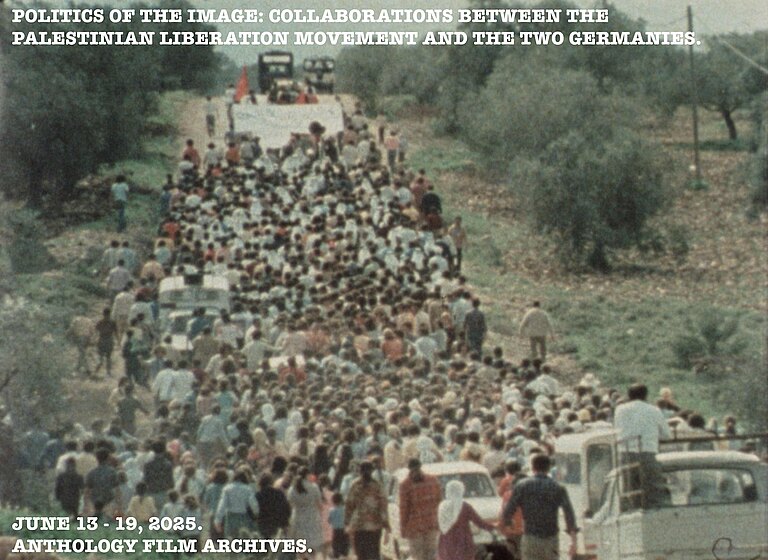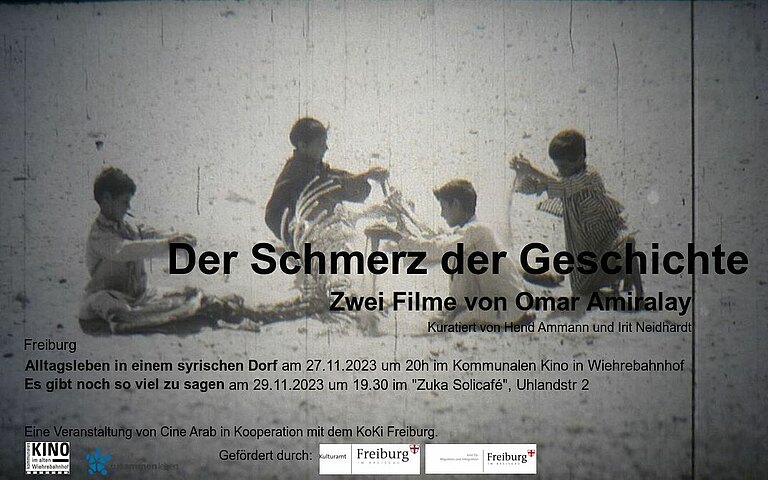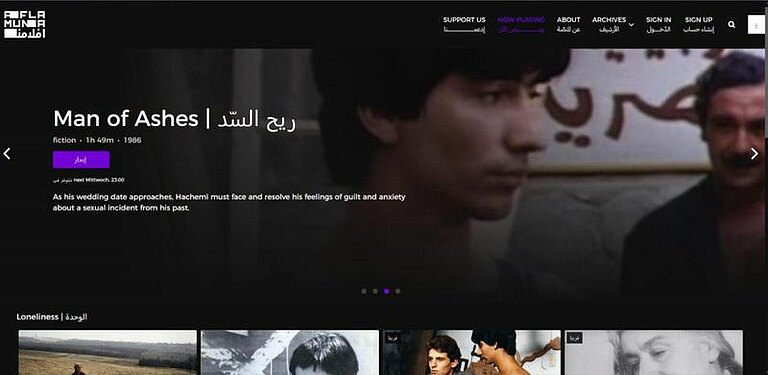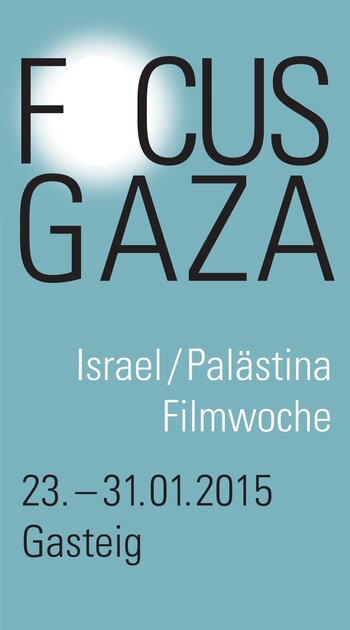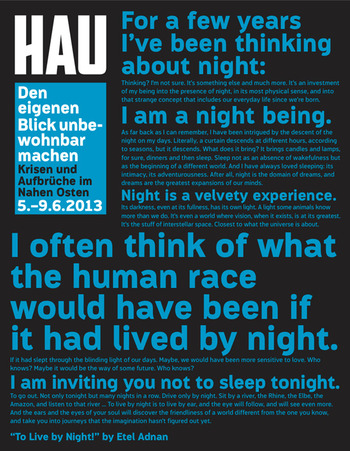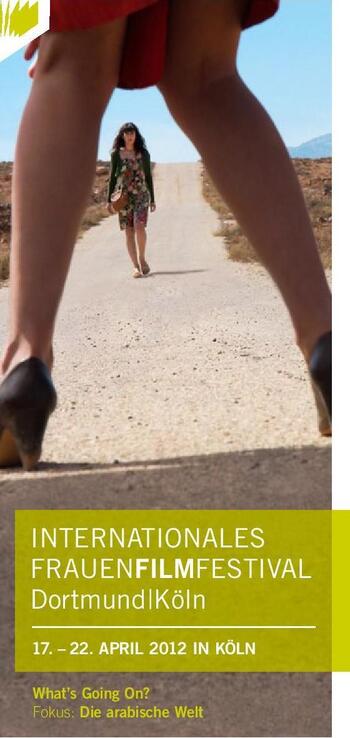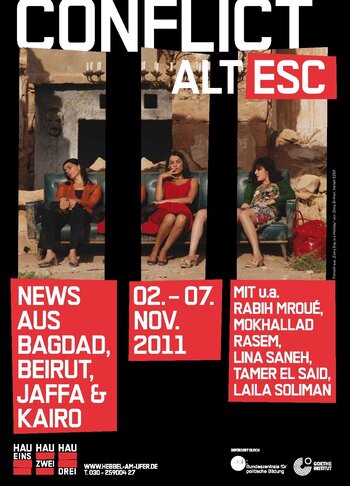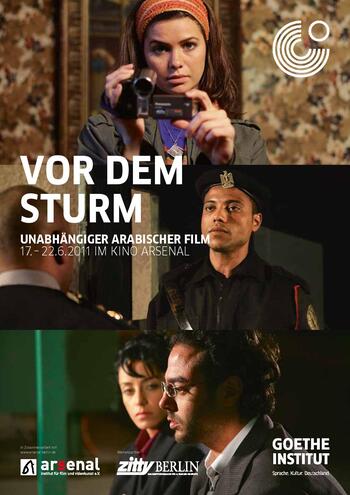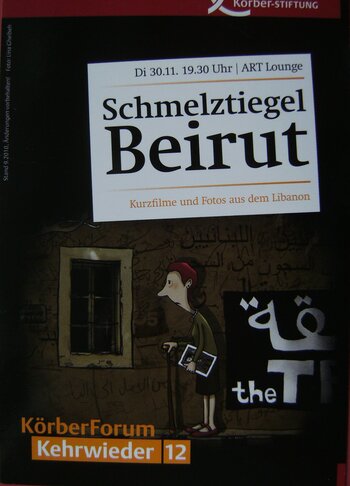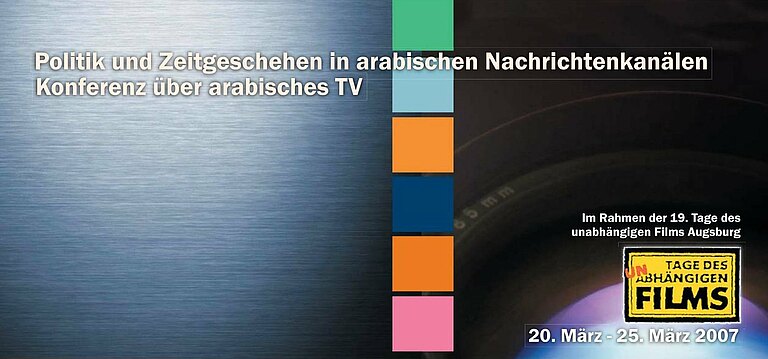Curatorial Work
In the Western media the Arab world has been present since years. It seems already somewhat familiar. What we know about the region though is reduced to the newsworthy sectors. In cinema or TV Arab films can be seen only on rare occasions. What kind of films do Arab directors make? And what defines their works as Arab? Or as Egyptian? Or Lebanese?
Film series or short film evenings allow to deal with a country or a subject matter in a more comprehensive way and to question patterns of imagining the Arab World. By order of festivals, educational or cultural organizations I curate film programs. They can consist of short films and last only one evening, comprise different film genres and take place over some days or at regular dates over a longer period of time.
Here you find examples focusing on programs that have online references in English or Arabic. In the German version of this page the examples are far more exhaustive.
Politics of the Image: Collaborations Between the Palestinian Liberation Movement and the Two Germanies
Anthology Film Archives New York (USA) 2025
This series sheds light on the little known and rarely explored cooperation in film and TV between the Palestinian Liberation Organization (PLO) and the two Germanies during the last decades of the Cold War. In the 1970s and 80s, the film groups and cultural organizations of the PLO worked closely with film institutions in the socialist German Democratic Republic (GDR) and with filmmakers from the capitalist Federal Republic of Germany (FRG). These collaborations continue to have an impact today, for example in Palestine TV and its partnership with German public television, the foundations of which the PLO established via East- and West-German joint contracts and projects during the 1980s.
As the series demonstrates, the PLO-GDR co-productions and collaborations were characterized by mutual dependency with regard to international political recognition. Moreover, the PLO had hard currencies, which the GDR desperately needed, while the GDR commanded a strong film infrastructure, which the PLO lacked. The PLO’s collaboration with West-German individuals was less formalized and therefore more flexible. continue (pdf)
The program had 8 programs with 14 films in total, made by directors from Palestine, Iraq, Lebanon, GDR and FRG between 1969 and 1987.
The Pain of History. Two Films by Omar Amiralay
Cine Arab in Cooperaion with Kommunales Kino Freiburg (Germany) 2023
Curated by Irit Neidhardt and Hend Ammann
Omar Amiralay (1944-2011) is one of Syria's best-known filmmakers internationally. In the thirty years of his cinematic work, the documentary filmmaker created an idiosyncratic portrait of his country. While Amiralay was initially full of hope for the socialist revolution in Syria, he quickly became an outspoken critic of the Arab Socialist Baath Party, which has been in power since 1963. He made one of his first and one of his last films in close collaboration with his friend and companion, the playwright Saadallah Wannous (1941-1997). The two wrote the book for Amiralay's first feature length film, EVERYDAY LIFE IN A SYRIAN VILLAGE (1974, b/w, 90 min) together. They called the film the experiment of filming all aspects and problems of Syrian village life and saw the task of films as creating a precise mirror “in which the viewer can recognize himself and thus understand his situation and the possibilities for changing it”. Twenty-three years later, THERE'S STILL SO MUCH TO SAY (1997, b/w & color, 49 min) was made in which Wannous, shortly before his death, reflects on the life of their generation, which was strongly influenced by the Arab-Israeli conflict, and his ideas about the conditions of a coexistence in the Middle East that he will no longer live to see. continue in German
Loneliness / Unity
Aflamuna online 2022
Many posters of Arab arthouse films of the past ten years show someone from behind or leaving, sometimes looking away. In rare cases where a character is looking at the camera there is still a distance, be it created by a curtain or by the person standing far afield. When the films show in Europe, the programmers usually do not use these posters. They look for a film still with the protagonist making eye contact with the viewer as is custom for the promotion of Western movies. As a distributor of several of these films, I first found this disturbing. Don’t programmers see that the person needs protection? At the same time, didn’t the director make the film to connect with the world? Looking at older Arab film-posters, it appears that protagonists of films dealing with loneliness are less hidden. What role does loneliness play in Arab cinema, and how did it change over time?
Loneliness, the mental pain of being isolated, always relates to the social. It seems to be specific to the Arabic language, though, that the word for loneliness, wehda, also means unity. For example, in English, French, or German, loneliness and unity are antipodes. Painful isolation has been integral to Arab cinema since its inception. continue in English | Arabic
The program included four Arab feature films and four Arab short films from the 1970s to the 2010s. Aflamuna.online can be viewed worldwide, the programs are online for a month, the film selection is accompanied by a detailed curatorial text.
Glow of Memory. Retrospective of German Palestinian Coproductions
Zeughauskino in the Museum of German History Berlin 2015
The retrospective Glow of Memory provides an insight into the collaboration between the Palestinian Liberation Organization PLO, founded in 1964, and both German states with regard to film. At its peak in the 1970s and 1980s, the national liberation organization was an internationalist movement. Numerous foreigners have been involved in it and many have cooperated with it. Documentary films played an important role in the PLO's information policy and the creation of a counter-public in the time when television was established as a mass medium. With the films, the international public should learn about the life of the Palestinian refugees and gain the PLO sovereignty over the image of Palestinian politics and history. From the late 1960s until its withdrawal from Beirut in 1982, the liberation organization repeatedly invited foreign filmmakers to document the lives of Palestinians in the refugee camps. Their narrative style made the cause of the Palestinian struggle more accessible to audiences in their respective countries of origin.. Continue in German at Zeughauskino | Program Booklet in Arabic and German (PDF)
The program consisted of medium-length documentaries, a usual format for the time, and the only feature film that the PLO produced, an adaptation of the novel RETURN TO HAIFA (Kassem Hawal, 1981) with Christine Schorn in a guest role. Only films whose directors were available for Q&As were selected.
A selection of three films from the Zeughaus Kino program was shown at the Days of Cinema Ramallah / Bethlehem / Jerusalem 2016, in collaboration with the Goethe Institute, and the Palestine Braodcasting Corporation, the host of the national audiovisual archive of Palestine. At the Beirut Cinema Days 2017, three more films were shown as part of the program focus Cinema of Exile from the Glow of Memory program.
Filmweek: Focus Gaza
Filmstadt Munich / Germany 2015
Curated by Irit Neidhardt, Ulla Wessler, Jewish-Palestinian Dialogue Group Munich
In summer 2014 the news were dominated by the Gaza-war. Again. Since at least 3000 years Gaza is fought over. Since the beginning off lm history in the late 1890s moving images of the place have been dealing with war. Normally the images were recorded by the conquerors or other outsiders. What do they see in Gaza? How do they record the life in the coastal strip? Which stories do those living there tell?
By presenting films from and mainly about Gaza - made in the last thirty years - this program explores various facets of the coastal strip. program booklet online (in German)
The program included ten medium-length and full-length films, most of which are by European and Israeli directors, as well as the short film CONDOM LEAD by the twins Arab & Tarzan Nasser from Gaza, which premiered in Cannes in 2013. The films presented in the program were made between 1984 and 2013.
Viva Palästina – Palestinian Insights
Palestine Days Munich / Germany 2014
Short films by Palestinian directors with introductions by Irit Neidhardt, mec film, Berlin and followed by discussion. The selected films are documents of a Palestinian film history in which the political development is mirrored: from utopia to dystopia. From the initial hopes after the PLO’s founding years in the late 1960s, via the realism of the later years, accounting with the promises of revolutionary cinema to the still stand of the present, reflected on in Sci-Fi. More (in German)
Historical PLO-Films
Kommunales Kino Hannover, in the framework of the Filistina 2014
Since the late 1960s, various organizations have produced films under the umbrella of the PLO, the Palestine Liberation Organization. Films were a tool in the liberation struggle, they usually only lasted half an hour and were educational in nature. They were addressed both to foreigners and to the Palestinian population in exile countries. Up to six or seven language versions were produced per film, which often included German. The internationalist PLO also collaborated with progressive states, organizations and individuals. The PLO's Department of Culture and Information had a production agreement with DEFA, the GDR's state production company, and some of the films that were broadcast on public television in the Federal Republic of Germany were made together with the PLO.
The program constisted of three PLO - German coporductions. program booklet cinema (PDF)
STORM! A Journey in Eight Mass Movements Through the Short 20th Century / the slot PLO
Retrospective: STORM! A Journey in Eight Mass Movements Through the Short 20th Century
Curator: Olaf Möller, Curator of the PLO slot: Irit Neidhardt; DOK.Leipzig / Germany 2013
Curatorial text: "Another anniversary: Since 1973 a PLO delegation attended the International Documentary- and Short Film Week every year. No other liberation movement and no young nation state were represented at the festival with their own productions as continuously as the PLO. Leipzig became an important platform for the cultural policy of the PLO – for years festival visitors could track the Palestinian struggle for liberation. Additionally from 1973 till 1982 the PLO awarded an own film prize at the festival. Irit Neidhardt is preparing an in-depth research about this part of international film history that is by now surrounded by myth" (Olaf Möller). The films in the program, THEY DO NOT EXIST (1974; Mustafa Abu Ali), THE LAND OF BARBED WIRE (1980; Kais al-Zubaidi) and BORN OUT OF DEATH (1981; Monica Maurer) were awarded in Leipzig in their respective years. In the presence of Kais al-Zubaidi and Monica Maurer.
To Render the Own Gaze Inhabitable. Crisis and Departure in the Middle East, the film program
Curator: Aenne Quiñones, Curator film programm: Irit Neidhardt, Hebbel am Ufer Berlin / Germany 2013
Curatorial text: "Etel Adnan (*1925), the “grande dame of Middle Eastern literature,” is one of the great political artists of our time. Her work is pervaded with the past and present of colonialism, the destructive force of which can be seen in the Middle East to this day. The uprisings in Tunisia and Egypt have been dubbed the Arab Spring by western media, and have entered our consciousness as so-called Facebook revolutions. There was interest – for a brief period – mostly in young people. But the best-agers from Tahrir Square and in the innumerable assemblies, action groups, and commissions remained largely unmentioned" (Aenne Quiñones). Continue
Inspired by the period of the Lebanese artist Etel Adnan's artistic work as well as important thematic discussions in her work, the film program primarily showed Lebanese documentaries. They deal with various crises and upheavals in the country and refer to the international context in which the once strong Lebanese left stood. A new feature film from Egypt was shown. The program asked what artistic expression filmmakers of different generations use to counter the never-ending state of war and social aglossia.
The program included four full-length films as well as the panel discussion NOW AND UNTIL VICTORY – ART AND PROPAGANDA with the following announcement text: “Since 2011, there have been numerous cultural events in Germany about the Arab Spring. They fundamentally support “the revolution.” The invited artists are supposed to analyze politically and explain the upheavals in general. Their art, especially the videos, is often propagandistic. A fact that is not debated. "Arab directors, who sometimes use their art in the service of propaganda, discuss their works from various wars and crises."
What’s going on? Country Focus: the Arab World
Dortmund | Cologne International Women’s Film Festival / Germany 2012
Curated by Irit Neidhardt, Betty Schiel and Sonja Hofmann
The Country Focus section at the film festival acts as a showcase for the cinematic oeuvre of women directors working in a given region. A year after the Arab Spring, the festival is pleased to organise an encounter with women film-makers based in North Africa and the Middle East whose films were made before the actual uprisings. The women's multi-layered and imaginative analyses of their societies from within offer an intriguing look at areas of conflict and levels of contradiction in the Arab world. What stories do the Arab film-makers have to tell and what are the female characters like? Continue in English
The program included seven full-length films from Tunisia, Lebanon, Jordan, Morocco and Egypt, several of the directors introduced and discussed their films in person. There was also a workshop discussion with the Iraqi-British director and editor Maysoon Pachachi about her documentary work in Palestine, Iran and Iraq.
Banned and Popular: the Egyptian films
In the program Banned and Popular the Egyptian films, dOCUMENTA (13) Kassel / Germany 2012
This part of the dOCUMENTA (13) film program pairs a film banned, censored or unauthorized by its own country of origin with a film from the same time and place that achieved local acclaim, either via box-office success or through the winning of popular awards and nominations.
FILM: Egypt - Popular: Al-Irhab Wal-Kabab (Terrorism and Kebab)
FILM: Egypt - Banned: Al-Mohager (The Emigrant)
As in other of his films before, the renowned Egyptian filmmaker Youssef Chahine uses historical or mythological subject matters to discuss current social issues, in THE EMIGRANT it is the Genesis story of Joseph. With all the necessary approvals from the state censors, the film was successfully released in cinemas when Islamic religious authorities imposed a ban based on a fatwa that banned the depiction of prophets in any artistic work. After winning a legal battle, Chahine faced a second ban initiated by a Christian Coptic lawyer who accused the director of being unfaithful to the biblical figure of Joseph.
TERROR AND KEBAB by Sherif Arafa is one of the few Egyptian comedies to have attracted international attention so far. While the film's depiction of bureaucracy is humorous and grotesque, the anti-hero is brutally laughed at.
more at dOCUMENTA (13)
Conflict Alt ESC. News from Bagdhad, Beirut, Jaffa & Kairo
Curator „Conflict Alt Esc“: Matthias Lilienthal; Curator of the film and discourse program: Irit Neidhardt, Hebbel am Ufer (HAU) Berlin / Germany 2011
Curatorial text: “The Middle East has been considered a crisis region for decades. With every major eruption of violence, the film industry goes into production, especially since September 11, 2001: The second Palestinian intifada, with its escalation of suicide bombings and Israel's construction of the wall, has been on screens for quite a long time. The films about the Cedar Revolution in Lebanon in 2005 had just completed the festival year when the - mostly short - works on the June War of 2006 followed, replaced by the Gaza War of 2008/9. Hollywood is the main producer of the Iraq War. And now the revolutions”. Continue in the newspaper supplement Conflict Alt ESC (PDF, in German), including conversations between the curator and the artists involved.
The film and discourse program was entitled EMERGENCY AS ROUTINE and included three films from Egypt, Lebanon and Palestine. There was a conversation about Tamer El Said's film IN THE LAST DAYS OF THE CITY, which was still in the making. Work on the film began before the uprisings of January 2011, the question now was whether and how the political changes would be incorporated into the film. Additionally a reading from Ibtisam Azem's novel THE SLEEPMAN GHARIB HAIFAWI took place and a panel discussion with some of the artists about the questions of the program: “In recent years, a generation of artists has established itself in the Arab world that was born into theregion's crises. In their work they deal with emergencies that have neither beginning nor end and with the surreality of their reality. How do they develop their stories? What does it mean for them to be dependent on European funding and audiences?”
Before the Storm. Independent Arab Film
Curator Arab Shorts: Marcel Schwierin, curator of the feature length film section: Independent Egyptian Film – Independent from What?: Irit Neidhardt, Arsenal Institut für Film und Videokunst / Germany 2011
The "Before the Storm" series focuses on independent cinema from Arab countries. Over six different evenings, the Goethe Institute will be presenting insights into the period before the "Arab Spring", showing both features and shorts about societies in the "waiting room of time".
Independent Egyptian films – regardless of what?
The feature film program presented two feature films by directors Ibrahim el Batout and Ahmed Abdallah each, which were available for discussion with the audience. El Batout and Abdallah's films were important reference points for the Tahrir Square insurgents. They describe their work as follows:
“I don't think I have to give my script, my ideas, to someone who approves the way I think and gives me the OK to continue. ... I believe in a different system of filmmaking, which I followed with my own digital camera - here and in Iraq." Ibrahim el Batout in 2009 on the making of his film AIN SHAMS.
“HELIOPOLIS is a film about what doesn't happen - a reflection of reality in which people who could make a difference don't meet... time passes, but I haven't evolved. Such people represent the Egyptian status quo.” Ahmad Abdalla in 2009 about his film HELIOPOLIS.
Continue (in German)
Forum of Berlinale 2011 (ad hoc program following Mubarak's resignation in Egypt)
A moderated program of short-films, trailers and video-letters by independent film-makers from Egypt
The current uprisings in North Africa took many by surprise. Since weeks the upheaval in Egypt dominates the news, the urgency and tremendous energy expressed by millions of Egyptians on a daily basis finds little echo in Europe though. Until a few weeks ago Tunisia and Egypt were seen as stable countries from a Western point of view. Their dictators were reliable partners to European and USA governments and their landscapes are invitingly beautiful tourist destinations. Continue Press Release (PDF) | Program Leaflet (PDF)
ART Lounge: Melting Pot Beirut
Körber Stiftung Hamburg / Germany 2010
At the ART Lounge Lebanon, film curator Irit Neidhardt introduces three short films by Sabine ElChamaa, Lina Gheibeh and Carlos Chahine. Moreover photos by Dalia Khamissy and an artist talk with the photographer. More
Focus on recent independent Arab Film-making (film program and TV conference)
Days of Independent Film Augsburg / Germany 2007
Focus on new independent film-making in the Arab World see program online
Current Affairs and Culture in Arab News Stations. Conference on Arab TV
The conference introduces issues of Arab TV on a general basis and looks into concrete examples of current affairs and cultural programmes produced for and broadcast by the two transnational news-stations. Continue
